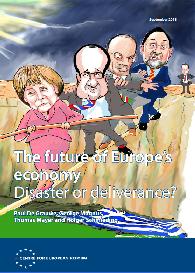Whyte, P. and Tilford, S. eds., (2013), The future of Europe’s economy: Disaster or deliverance?, Center for European Reform, 18 Σεπτεμβρίου. The CER invited four leading economists to predict what the European economy will look like in 2020. Their answers differ sharply. Paul De Grauwe fears for the future because the eurozone’s creditor countries have succeeded in loading nearly all of the cost of eurozone adjustment onto the debtor nations. …Read More
Euro-Zone Unemployment Unlikely to Fall Quickly
Billington, I., (2013), “Euro-Zone Unemployment Unlikely to Fall Quickly”, The Wall Street Journal, The Euro Crisis Blog, 10 Σεπτεμβρίου. The euro zone may have emerged from recession this year, but unemployment is unlikely to fall quickly with companies less likely to hire staff in the final three months of the year than they were earlier in 2013, a survey of employers showed Tuesday. The quarterly Manpower Employment Outlook shows that, while there …Read More
The Global Competitiveness Report
World Economic Forum, (2013), “The Global Competitiveness Report”, 4 Σεπτεμβρίου. Excellent innovation and strong institutional environments are increasingly influencing economies’ competitiveness, according to The Global Competitiveness Report 2013-2014, which is launched today. The report’s Global Competitiveness Index (GCI) places Switzerland at the top of the ranking for the fifth year running. Singapore and Finland remain in second and third positions respectively. Germany moves up two places (4th) and the United States …Read More
Interim Economic Assessment
OECD, (2013), “Interim Economic Assessment”, 3 Σεπτεμβρίου. A moderate recovery is underway in the major advanced economies, according to the OECD’s latest Interim Economic Assessment. Growth is proceeding at encouraging rates in North America, Japan and the UK. The euro area as a whole is out of recession, although output remains weak in a number of countries.
Social Protection Rights of Economically Dependent Self-employed Workers
Eichhorst, W., Kahanec, M., Kendzia, M., Wehner, C., et al. (2013), “Social Protection Rights of Economically Dependent Self-employed Workers”, IZA Research Report, N. 54. The study analyses the role of economically dependent self-employed workers in the labour market by taking institutional factors into account, such as labour law and social protection rights. In addition to setting out the reasons for the increase of dependent self-employed workers, the authors provide case studies across …Read More
Benchmarking Working Europe 2013
ETUI, (2013), “Benchmarking Working Europe 2013”. Widening economic and social gaps among EU member states, as well as among different groups and categories of citizens within society, are not only placing in jeopardy the future of Social Europe but threatening to undermine also the whole project of European integration. The post-2008 recession and debt crisis, helped along by EU leaders’ obstinate clinging to the failing remedies of fiscal austerity, have …Read More
The G-20 and Central Banks in the New World of Unconventional Monetary Policy
Brookings Institution, (2013), “The G-20 and Central Banks in the New World of Unconventional Monetary Policy”. Five years after the first meeting of G-20 leaders, and decisive action by the central banks and treasuries of the world’s major economies that prevented the financial crisis of 2008-2009 from turning into a 1930’s style world-wide depression, the world economy still remains fragile. The original fiscal stimulus agreed upon in the April 3rd …Read More
2013 Spillover Report
IMF, (2013), “2013 Spillover Report”, IMF Policy Paper. Five years after the global financial crisis, the severe tensions and risks rooted last year in some of the “Systemic five” (S5)—China, euro area, Japan, United Kingdom, United States––have abated but all five are still operating below potential, i.e., they are not contributing to global activity as much as they might: if they could somehow close their output gaps, global output would …Read More
The Shadow Economy
Schneider, Fr., Williams, C., (2013), “The Shadow Economy”, The Institute of Economic Affairs. To some people, the shadow economy is a great example of free economic activity at work. It is entirely unregulated except by the participants themselves; no tax is paid on shadow economic activity; and it may be possible to pursue activities in the shadow economy which are prohibited by law unjustly. Indeed, the smugglers of Sussex are …Read More
European business cycle indicators
European Commission, (2013), “European business cycle indicators”, 2nd Quarter 2013. Apart from useful tools for the assessment of the overall economic picture, the EU-wide harmonised survey programme for the business sector also provides more granular information about the factors underlying managers’ assessment of the business situation. Questions on ‘factors limiting production’ allow to investigate the sources of potential limitations to business activity, e.g. whether they are rooted in the demand …Read More





